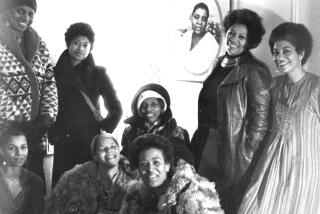Reagan as Soviet negotiator in chief
In “The Rebellion of Ronald Reagan: A History of the End of the Cold War,” James Mann makes the point that Ronald Reagan along with Richard Nixon were the two most stalwart voices of anti-communism in the Cold War generation. But Reagan, unlike Nixon, has also been perceived, in many ways, to be under the influence of various advisors on the Cold War. Mann persuasively argues against that, showing how Reagan defied the stereotype that his views were controlled by others. Instead, Reagan set his own course in talks with Mikhail Gorbachev that, ultimately, Mann writes, had a significant influence upon the end of the Cold War.
Mann has written a superb book; that should come as no surprise to readers of this newspaper, who may recognize him as a former correspondent and columnist for The Times, as well as the author of “Rise of the Vulcans,” a study of the key foreign policy players in the George W. Bush administration.
Mann recounts that, in seeking better relations with the Soviets, Reagan was opposed on three fronts. Not surprisingly, the first opposition group came from the political right (ironically the very force that put Reagan in power in the first place), represented by the National Review and columnists such as George F. Will. The second was the so-called realists, which comprised first and foremost Nixon and Henry A. Kissinger, who had pursued detente in the 1970s with the Soviet Union -- it was a policy Reagan so abhorred and which he campaigned against, in no small way leading him to the presidency. They thought Reagan was going too far. The last of the three groups, Mann writes, was made up of large segments of the intelligence community and military. They didn’t think that the Soviet Union was changing as much as Reagan and his secretary of state, George P. Shultz, believed. Despite opposition, Reagan remained intrepid in his negotiations with Gorbachev -- negotiations that would play no small part in the end of the Cold War. (Of course, Reagan’s leadership was accompanied by the implosion of the Soviet Empire -- but, as this book illustrates, Reagan’s skill was absolutely paramount.)
Mann is a superb reporter who, despite the seriousness of the subject, weaves in entertaining anecdotes such as a secret 1987 visit by Nixon to the White House. There, Nixon met with Reagan, telling some corny and pathetic jokes about the Watergate tapes before advising Reagan that he was moving too swiftly, unwisely, in his dealings with the Soviets. Reagan listened, and then he went his own way.
“The Rebellion of Ronald Reagan” is divided into four sections. The first part examines the story of Reagan and Nixon, arguably the two most fascinating politicians of the postwar era. Mann sees their relationship as a window into Reagan’s development toward wanting better relations with the Soviets while remaining true to his anti-communist views. The second section is particularly interesting for its portrayal of Reagan’s relationship with Suzanne Massie, an informal advisor, who studied the Soviet Union but didn’t belong to the foreign policy intellectual establishment. Mann credits Massie with being influential in helping to change Reagan’s view about the Soviet regime, which he had, not long before, famously referred to as “the evil empire.”
The book’s third section gets into the nitty-gritty behind Reagan’s dramatic 1987 speech in Berlin at the wall, in which he emphatically stated, “Mr. Gorbachev, tear down this wall.” Here again, Reagan went against the advice of his staff, including Shultz, all of whom feared that he would damage relations with Gorbachev and the Soviets (Mann notes the irony in this attitude being held by the same people who criticized Reagan for trying to establish better relations). Reagan followed his own instincts on the speech and delivered arguably the most dramatic words of his presidency. The book’s fourth part examines the details of the easing of Cold War tensions in Reagan’s last two years in office. Reagan’s leadership convinced the country that it did not need to exist in a state of permanent cold war with the Russians.
As with many new studies, Mann had access to newly released documents, including those showing internecine feuds within the White House. Mann also conducted numerous significant interviews, including ones with Shultz, Kissinger and Nancy Reagan. With “The Rebellion of Ronald Reagan,” Mann offers an outstanding study of the evolution of a president facing the most insurmountable issues of his time and succeeds in revising the view of Reagan’s role in the Cold War. That’s no small feat.
--
More to Read
Sign up for our Book Club newsletter
Get the latest news, events and more from the Los Angeles Times Book Club, and help us get L.A. reading and talking.
You may occasionally receive promotional content from the Los Angeles Times.






